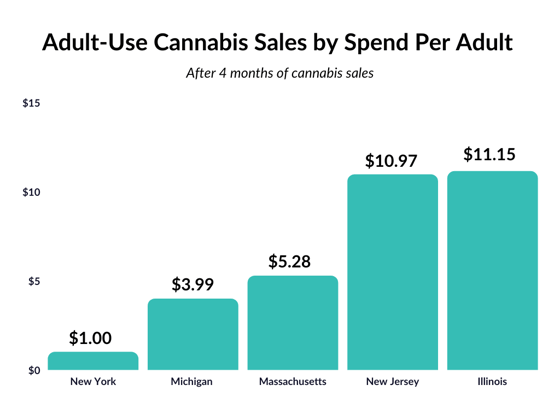This post is part of Brightfield’s East Coast Cannabis Update - Download the Whitepaper.
Local legislators who are seeking to legalize cannabis within their own states should love New York. They don’t need to look at other states to get a sense of the ideal approach to cannabis regulation. Instead, just look at what New York has done and do virtually the exact opposite. It’s hard to imagine an adult-use launch going much worse than the Empire State’s.

In April 2023, regulators revealed that, since sales officially began in the last few days of 2022, New Yorkers had purchased a bit less than $17 million dollars' worth of regulated cannabis. This equates to just over a dollar per adult resident of the state. Over the same length of time, immediately after launch, New Jersey had $10.97 while Illinois had $11.15.
Even states that got off to slow starts, like Michigan and Massachusetts, look like they were moving at light speed in contrast with New York’s, a market opening that’s uptake speed resembles a sloth on sedatives.
What Went Wrong with New York Cannabis
So, what went wrong? It starts with retail licensing. The state decided to require that cannabis retail applicants have a “significant retail presence” in New York and that they have a marijuana-related conviction. While the commitment to restorative justice is admirable, this approach did prompt a lawsuit from an aggrieved applicant that led to an injunction that prevented the state from licensing stores in five areas of the state, including Brooklyn and Central New York.
While a contributor, this isn’t the cause of the launch’s failure – only 63 of the state’s 150 planned first-round retail locations were impacted by the suit. No, the problems are much more systemic. From the outside looking in, it almost appears as if New York examined the obstacles that other states ran into with their own regulatory schemes and intentionally decided to run into them headfirst.
The trials started with the number of planned licenses – 150 during the first round. This equates to one retailer per 105,000 residents, about the entire capacity of Yankee Stadium, Citi Field, and Madison Square Garden combined. States successfully displacing legacy sales have had at least five times more cannabis retailers than New York planned for. Even if the state ends up adding more later, such a dismally low starting figure ensures that it will be years before dispensaries are sufficiently widespread to make it convenient for consumers. New York City alone is able to support well over one thousand unlicensed stores while regulators are busy engaging in a sluggish dance of procrastination.
Botched Adult-Use Cannabis Launch in New York
Regulators wanted the market to launch in late 2022. They opened the application period towards the end of August and granted the first applications in late November, much later than should have been the case if regulators wanted a functional market in place before the year’s end.
In the middle of December, after some licenses were issued, they changed how finding a location works. Previously, the state had committed to picking selecting the properties themselves and handing them to individual stores, while now retailers themselves are required to find their own locations within a specific area and submit them to the state for approval – something of a rug pull that increased the capital costs for many already deep in the application process.
This perpetual loop of inefficiency and confusion came to a head on December 29th when a single nonprofit store opened its doors to adult-use sales. Sure, that sounds bad, but of course, a bunch more retail openings were right around the corner, right? More than five months later and only twelve stores are operating in the state.
New York regulators have granted a bunch of additional licenses in early 2023, but considering that 36 licenses were granted in November 2022, another 30 in January 2023, and only 12 stores are operational as of June, it would be surprising if the number total adult-use retailers even sniffs the 100-store mark before the end of the year.
And after all this chaos and confusion, social equity owners aren’t even going to see that much of a benefit as New York looks poised to open the market to multi-state operators in the near future.
Disconnect For Growers and Social Justice
All of this is to say nothing of New York’s cultivators, who have been hung out to dry more than a batch of the finest, trichome-covered, terpene-filled artisanal flower that one could imagine. A month prior to launch, New York cultivators and manufacturers reportedly had more than $750 million in inventory, just waiting on the start of sales. Now, assuming they halted all operations immediately after this was true – something that’s exceedingly unlikely – they only have around $735 million worth of unsold, now 6-months old cannabis. This disconnect between retail and cultivator licenses and the pain and lost revenue it has caused can fall squarely at the feet of incompetent regulators.
New York’s prioritization of restorative justice feels especially ironic considering that the state and local lawmakers are cracking down on unlicensed retailers and are planning to harshen laws against unlicensed cannabis selling, currently punishable by only a $250 fine. Once again, a lesson has not been learned. Did the awful, violent policies of the war on drugs that sent cannabis sellers to prison for years stop the distribution of weed? Obviously not.
What has taken cannabis sales from streetcorners and the backs of cars to regulated institutions that carry safe and tested products? Effective regulations, high levels of competition, and licensing broad enough that it’s more convenient for the average person to stop by a store than it is to text their dealer. It’s mind-boggling that New York officials who purport to care about lifting up those hurt by America’s anti-drug policies haven’t realized this.
Conclusion
If this is what state legislators and regulators wanted to be the fate of recreational cannabis in New York, then that’s fine. The war on drugs has had reverberations up and down our society, particularly in marginalized communities, and working to correct those wrongs is admirable.
Many states have paid lip service to the matter but have completely whiffed in the follow-through, and New York placing it at the forefront of their regulation is admirable, even if the state’s commitment to the cause also appears to be wavering. But creating a non-viable, non-competitive, practically non-functioning market composed of shifting and patchwork regulatory measures is not going to do that. As things stand now, New York’s attempt to bring restorative justice via cannabis legalization feels more like it stems from state officials’ desire to give themselves pats on the back than it does from any genuine yearning to try to meaningfully compensate for history’s wrongs. Hopefully, that changes.
Bottom Line: By virtually every metric, New York has had the absolute worst adult-use market opening that the United States has seen thus far, and it's unlikely that a state will find enough new and creative ways to fail that it will be losing the crown anytime soon.

Published: 6/22/2023






